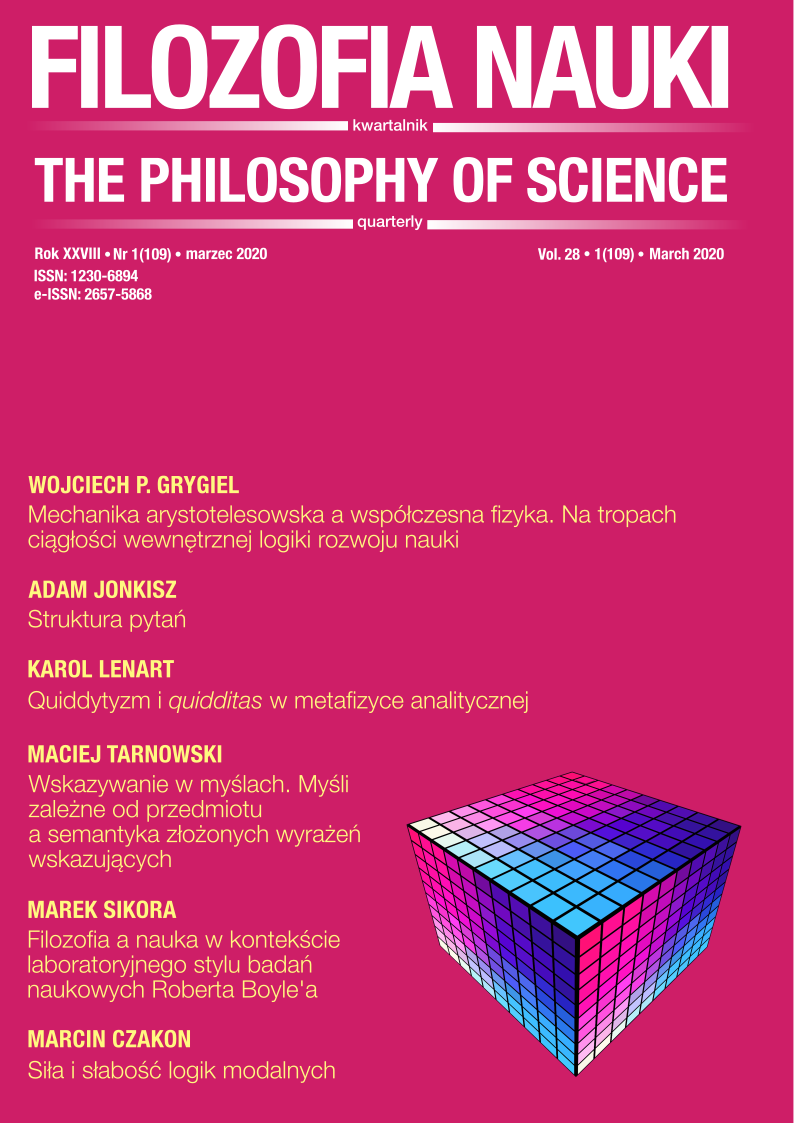Filozofia a nauka w kontekście laboratoryjnego stylu badań naukowych Roberta Boyle’a
DOI:
https://doi.org/10.14394/filnau.2020.0005Słowa kluczowe:
Robert Boyle, philosophy of nature and natural science, experimentalism, laboratory science, Radosław KazibutAbstrakt
This is a review of Radosław Kazibut’s book Filozofia przyrody i przyrodoznawstwa Roberta Boyle’a. Filozoficzna geneza nauki laboratoryjnej (Robert Boyle’s Philosophy of Nature and Natural Science: The Philosophical Origins of Laboratory Research), in which I highlight the strengths and weaknesses of the proposed approach. On the one hand, I appreciate the author’s effort to examine the origin of the laboratory style of research, which is found in Boyle’s studies, as a basis for a novel approach to the problem of the relationship between philosophy and science. On the other hand, I am critical of the fact that the author has overlooked several issues relating to the subject matter which, in the context of the topics addressed in the book, should be recognized as relevant. The characterization of the laboratory sciences presented in the book is too selective as it ignores the problem of the undesirable products of the laboratory sciences as well as their increasingly practical character.
Bibliografia
Amsterdamski S. (1983), Między historią a metodą, Warszawa: Państwowy Instytut Wydawniczy.
Banchetti-Robino M. P. (2011), Ontological Tensions in Sixteenth and Seventeenth Century Chemistry: Between Mechanism and Vitalism, „Foundations of Chemistry” 13(3), 173-186. https://doi.org/10.1007/s10698-011-9126-9
Banchetti-Robino M. P. (2015), From Corpuscles to Elements: Chemical Ontologies from Van Helmont to Lavoisier [w:] Philosophy of Chemistry: Growth of a New Discipline, E. Scerri, L. McIntyre (eds.), Dordrecht: Springer, 141-154. https://doi.org/10.1007/978-94-017-9364-3_10
Bhaskar R. (2008), A Realistic Theory of Science, London–New York: Routledge.
Jonas H. (1996), Zasada odpowiedzialności. Etyka dla cywilizacji technologicznej, tłum. M. Klimowicz, Kraków: Platan.
Hacking I. (1983), Representing and Intervening: Introductory Topics in the Philosophy of Natural Science, Cambridge: Cambridge University Press. https://doi.org/10.1017/CBO9780511814563
Hoffmann R. (1995), The Same and Not the Same, New York: Columbia University Press.
Kazibut R. (2019), Filozofia przyrody i przyrodoznawstwa Roberta Boyle’a. Filozoficzna geneza nauki laboratoryjnej, Poznań: Wydawnictwo Naukowe UAM.
Krimsky S. (2006), Nauka skorumpowana?, tłum. B. Biały, Warszawa: Państwowy Instytut Wydawniczy.
Kucharski D. (2015), Hobbesa krytyka metody eksperymentalnej Boyle’a, „IDEA — Studia nad strukturą i rozwojem pojęć filozoficznych”, XXVII, 241-253. https://doi.org/10.15290/idea.2015.27.t.t.14
Latour B. (2011), Nigdy nie byliśmy nowocześni. Studium z antropologii symetrycznej, tłum. M. Gdula, Warszawa: Oficyna Naukowa.
Mierzecki R. (1987), Historyczny rozwój pojęć chemicznych, Warszawa: Państwowe Wydawnictwo Naukowe.
Pietrzak Z. (2019), Spór o ontologię własności przyrody. Robert Boyle a perypatetycy, spagirycy i matematycy, „Studia z Historii Filozofii” 1(10), 141-168. https://doi.org/10.12775/szhf.2019.009
Shapin S., Schaffer S. (1985), Leviathan and the Air-Pump: Hobbes, Boyle, and Experimental Life, Princeton–Guildford: Princeton University Press.
Sobczyńska D. (1984), Osobliwości chemii, Poznań: Wydawnictwo Naukowe UAM.
Watkins J. (1989), Nauka a sceptycyzm, tłum. E. i A. Chmieleccy, Warszawa: Państwowe Wydawnictwo Naukowe.



















 Filozofia Nauki | ISSN 1230-6894 | e-ISSN 2657-5868
Filozofia Nauki | ISSN 1230-6894 | e-ISSN 2657-5868